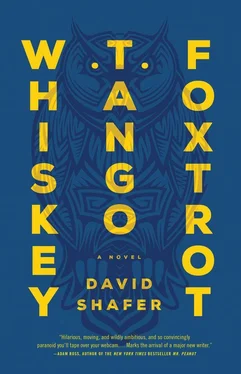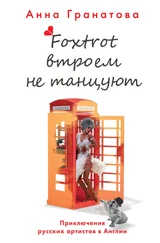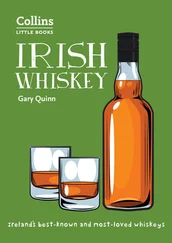“That’s what they’re going to do in Dublin.” Paige Turner had disengaged. She sipped her tea. “I told you: I’m just a travel agent. I’m not Communications. Listen, I’ve got to meet another client.” She neatened her little tea mess. “Have fun in Dublin.”
Leila decided not to attempt a response to this. This lady was not making sense. So she only nodded politely when Paige stood to go.
“Okay,” said Leila. “Um, I’m going to leave this phone here.” She actually hadn’t touched the mobile phone. It was a cheapo Nokia.
Paige was unfazed; she was slinging her chunky valise over her shoulder.
“Well, thanks for your time. I guess,” said Leila.
Paige checked her outfit, nodded at Leila, and strode away, toward Security.
“…you nutjob,” added Leila quietly to herself.
It was maybe two minutes later that Leila thought of her bag. The thought came to her suddenly, and she knew before she checked that she would find something terribly amiss. She knew because her heart and lungs dropped to her belly.
Correct: Her wallet, her planner, her phone, her laptop. They were all four gone. She straightened up and looked around herself quickly, accusingly, as if a paper airplane had just bonked her in the head. But in two minutes, alone in a moving crowd, the recoverable world slips away from you at a pace. There were no waitresses here.
The laptop had been replaced with a cookie tin the approximate size and weight of a laptop. In controlled shock, Leila opened the cookie tin and saw, along with cookies, a billfold, worn loose at its spine. As if with a purloined diary, she opened the wallet carefully. Inside, she found the documents of a person called Lola Montes who, it seemed, shared some of the general outlines of Leila’s life. Lola was a coastal North American with credit cards and a gym membership and business cards from restaurants. Lola had a U.S. passport, a California driver’s license, and a New York Public Library card. Lola looked a lot like Leila. Lola had a lot of cash: three hundred euros, one hundred pounds, two hundred and fifty dollars. Leila poked deeper into the wallet and found a napkin with numbers written on it, the corner of a postcard from Cancun, a rubber band around a little sachet of — what, ashes? — from India or somewhere. And in the wallet’s third layer, a picture of Leila’s brother, Dylan, and Scratch, her long-gone cat.
It was only then that Leila returned to the photo IDs. Okay, Lola didn’t look like Leila. Lola was Leila. Or Leila was Lola.
So. She was sitting in an airport holding a stack of high-grade forged documents, having been stripped of her own legitimate ones by an all-girl pickpocketing team.
It would be very hard to explain.
Still, they had given her something like a thousand dollars. Her own wallet had probably had about two hundred dollars in it. So this wasn’t larceny. Maybe this was exploding money or something. Or, oh yeah, maybe she was being recruited by a global counterconspiracy that was sending her to Dublin to meet its upper officers.
A calm descended upon her, and an awareness. She could have led mountain expeditions or been a sea captain, because when things just got fubar, she generally got steely and clearheaded. When Dylan had sliced his arm open that time he fell through the coffee table, it had been the fifteen-year-old Leila who wrapped it in a towel and kept it elevated and compressed. Her dad went all ashen and unhelpful; she told him to drive. Her mom just kept wailing; Leila told her to please be quiet.
So Leila knew at once that her best move would be to go along with this until some better option opened up. The possibility existed that she had already been played. If they could pickpocket and then put-pocket her after she went through security but before the plane, they could probably have her detained or worse, if that was their aim.
The cheapo Nokia chirruped and buzzed on the plastic table like a fly caught in a web: 1 New Message, the screen said. She pressed View.
Your papers will be returned to you in Dublin, after we meet. You can walk away then, if you like. DD.
There was a problem with Mark’s ticket to Rotterdam, which was where he was supposed to board Sine Wave . The problem with the ticket was that the SineCo representative at Heathrow didn’t have it. It was this man’s job to meet and see to the lounging, ground-transportation, and onward-travel needs of any of SineCo’s executives, upper-level contractors, and guests who came through Heathrow.
“Mr. Deveraux, can I take you to the lounge? I’ll come back for you there when I get this straightened out?” Mark asked if he could use SineCo’s private Heathrow lounge, which was behind about three unmarked doors and usually satisfied even the most self-important trans-Heathrites. But that room was in use, apparently. So the rep ordered up a golf cart and he and Mark sat facing backward on the rear seat. As the cart whizzed along the polished concourses, Mark saw things recede before they had approached and was put in mind of near-death experiences he’d read about. A luggage store zipped forward from behind his head and was whisked backward into his past. A yogurt kiosk was similarly birthed and then faded and winked out. The cart beeped like a satellite. They arrived at one of the fancier first-class lounges, and the rep saw Mark in and promised to return once the Rotterdam thing was straightened out. It was ten o’clock in the morning.
He collected three newspapers, a Superyachts Monthly, two bottles of water, and four croissants. He settled himself into a leather couch. He scoped out his fellow loungers, checking to see if anyone had recognized him. He ordered a cup of coffee from the steward and tried not to eat his croissants too quickly.
Mark dialed Straw’s main gatekeeper, Nils. He got no answer, so he texted: Glitch in Rotterdam meeting? Waiting at Heathrow. Pls advise. He was going to stay sober today.
Mark looked at the crossword in the paper, but it was a grueling Friday puzzle, and his eyesight was kind of swimming from lack of nicotine and too much coffee. He ordered a glass of tomato juice from the steward, and then said, as if it were the first time the idea had ever occurred to him, “On second thought, why don’t you make that a Bloody Mary.” He moved from the crossword to the Jumble. He made sure that no one had a sight line on what he was doing. The Jumble was for precocious children and retirees.
“What the lazy aphorist needed to finish the job” was the motto over the little illustration of a man sitting stumped at a desk, huge books piled on either side of him. The cartoonist had managed to convey the fact that the man was a blocked writer; something desperate about the eyes. The answer was a three-word phrase: one letter, four letters, three letters.
With the Jumble, you unscramble jumbled words and take the circled letters from the unscrambled words and use those letters to construct the phrase that answers the riddle in the motto above the picture. The trick was to kind of blur your eyes when you first looked at the jumbled word you were trying to decipher. You had to sneak up on the letters; notice them before you read the word; you had to remember how words looked before you could read.
KWHCA.
Whack . Just like that. Mark carefully inked the letters into the little boxes and extracted the C, the K, and the W, which had ended up within circles.
It was like Step Three: Notice Everything Anew. Though, come to think of it, it was also a bit like Step Five: Stay Open to the Possibilities. Yeah, the steps did kind of run together, like those of a bad dancer.
SMAHUB. This one resisted Mark’s eye-blurring trick. Bumhas? No, not a word. Shambu?
Читать дальше












